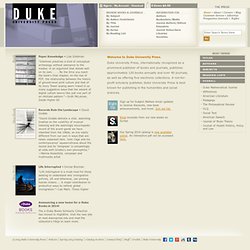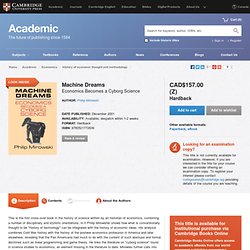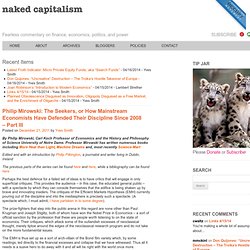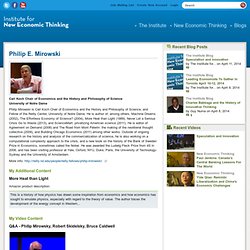

More Heat than Light: Economics as Social Physics, Physics as Nature's Economics - Philip Mirowski. Rizvi_on_Mirowski.doc. The Effortless Economy of Science. Duke University Press, internationally recognized as a prominent publisher of books and journals, publishes approximately 120 books annually and over 40 journals, as well as offering five electronic collections.

A not-for-profit scholarly publisher, Duke University Press is best known for publishing in the humanities and social sciences. Sign up for Subject Matters email updates to receive discounts, new book announcements, and more. Join our list. Read excerpts from our new books on Scribd. Our Spring 2014 catalog is now available online. Machine Dreams. This is the first cross-over book in the history of science written by an historian of economics, combining a number of disciplinary and stylistic orientations.

In it Philip Mirowshki shows how what is conventionally thought to be "history of technology" can be integrated with the history of economic ideas. His analysis combines Cold War history with the history of the postwar economics profession in America and later elsewhere, revealing that the Pax Americana had much to do with the content of such abstruse and formal doctrines such as linear programming and game theory. He links the literature on "cyborg science" found in science studies to economics, an element missing in the literature to date. Mirowski further calls into question the idea that economics has been immune to postmodern currents found in the larger culture, arguing that neoclassical economics has surreptitiously participated in the desconstruction of the integral "Self.
" Philip Mirowski: The Seekers, or How Mainstream Economists Have Defended Their Discipline Since 2008 – Part III. By Philip Mirowski, Carl Koch Professor of Economics and the History and Philosophy of Science University of Notre Dame.

Professor Mirowski has written numerous books including More Heat than Light, Machine Dreams and, most recently Science-Mart Edited and with an introduction by Philip Pilkington, a journalist and writer living in Dublin, Ireland The previous parts of the series can be found here and here, while a bibliography can be found here Perhaps the best defence for a failed set of ideas is to have critics that will engage in only superficial critiques.
This provides the audience – in this case, the educated general public – with a spectacle by which they can console themselves that the edifice is being shaken up by brave and innovating insiders. The EMH is thus set up as a sort of arch-villain of the Bond film variety which, by some readings, led directly to the financial excesses and collapse that we have witnessed. . – Philip Pilkington. Philip E. Mirowski. Carl Koch Chair of Economics and the History and Philosophy of Science Philip Mirowski is Carl Koch Chair of Economics and the History and Philosophy of Science, and Fellow of the Reilly Center, University of Notre Dame.

He is author of, among others, Machine Dreams (2002), The Effortless Economy of Science? (2004), More Heat than Light (1989), Never Let a Serious Crisis Go to Waste (2013), and ScienceMart: privatizing American science (2011). He is editor of Agreement on Demand (2006) and The Road from Mont Pèlerin: the making of the neoliberal thought collective (2009), and Building Chicago Economics (2011) among other works. Outside of ongoing research on the history and analysis of the commercialization of science, he is also working on a computational complexity approach to the crisis, and a new book on the history of the Bank of Sweden Prize in Economics, sometimes called the Nobel.
More info: The Road from Mont Pèlerin - Philip Mirowski, Dieter Plehwe.